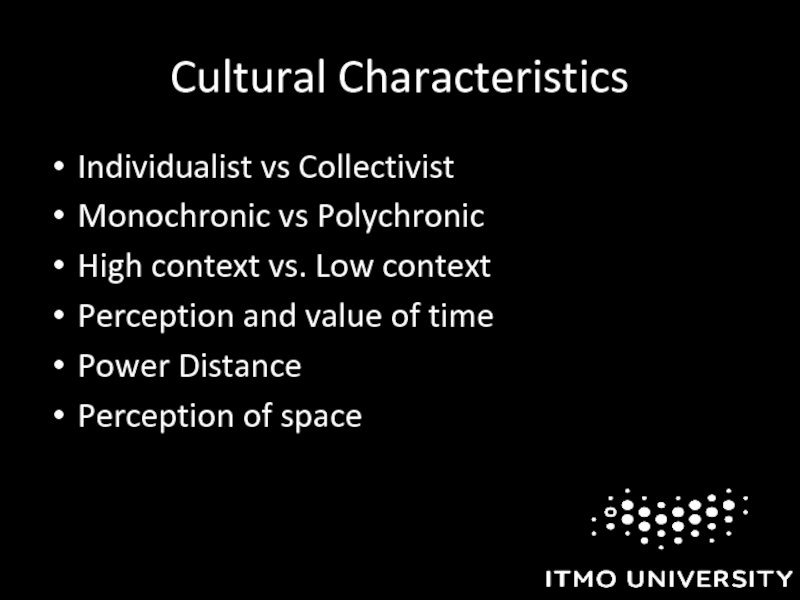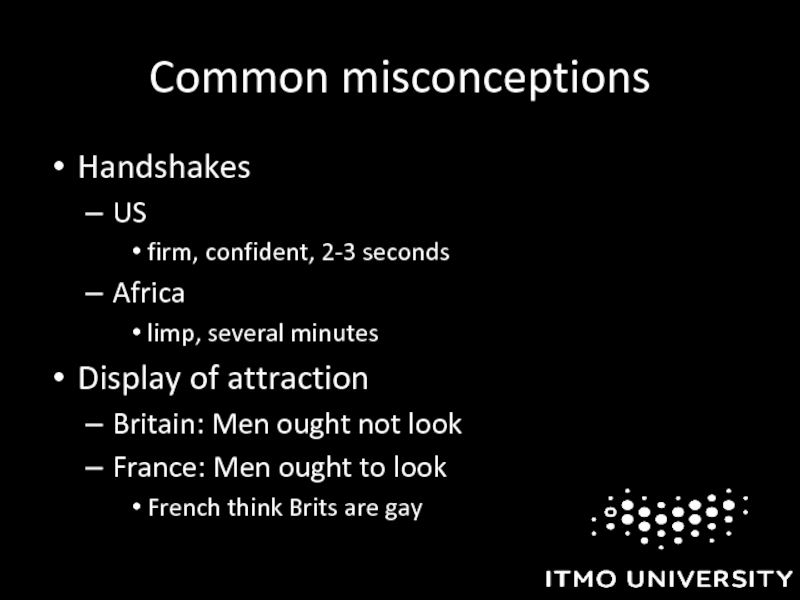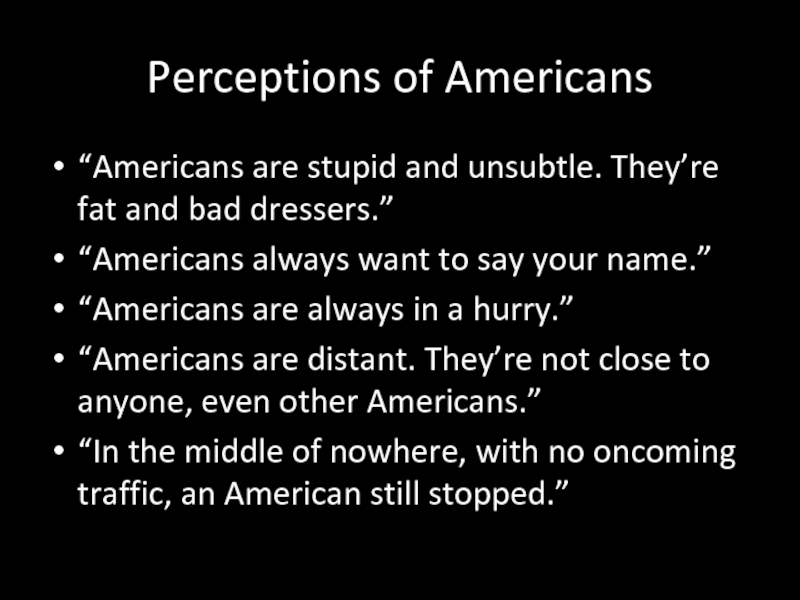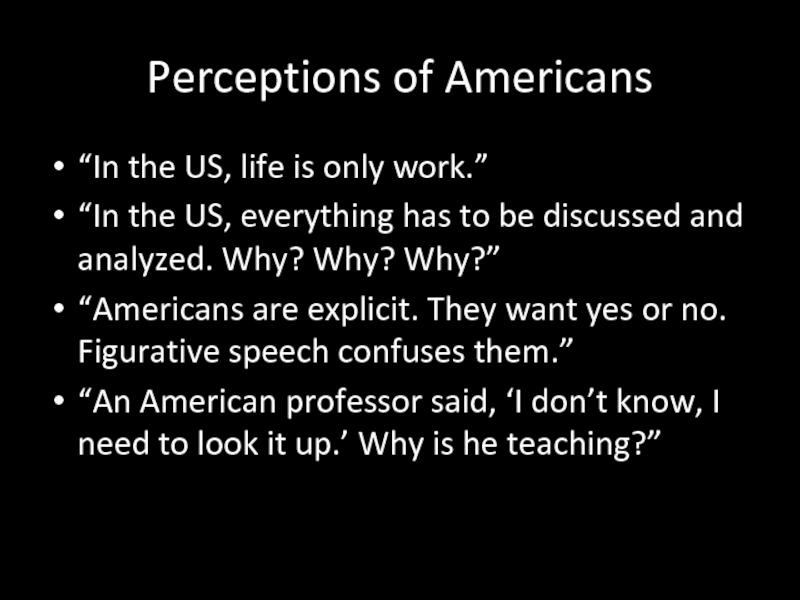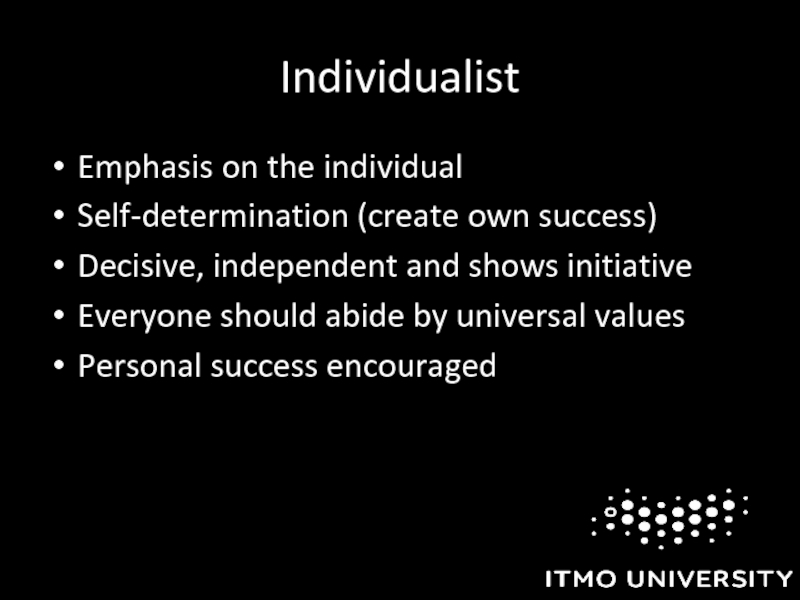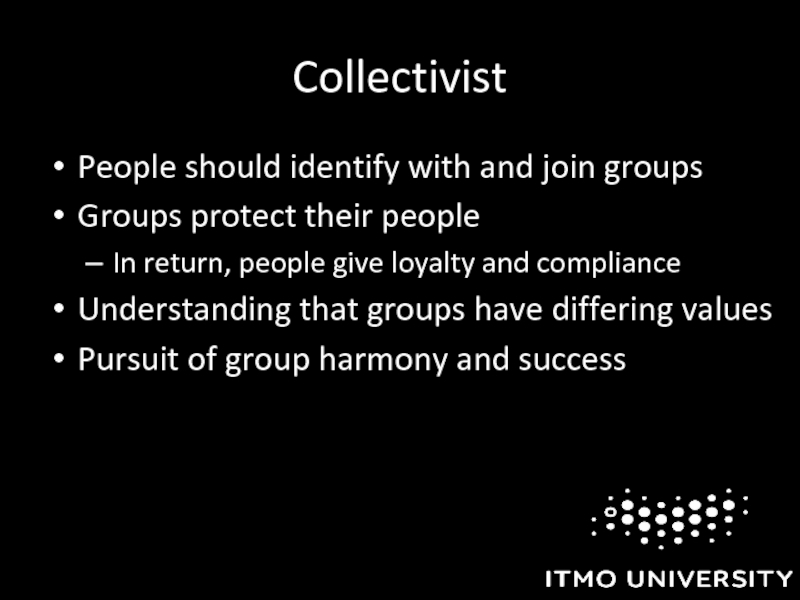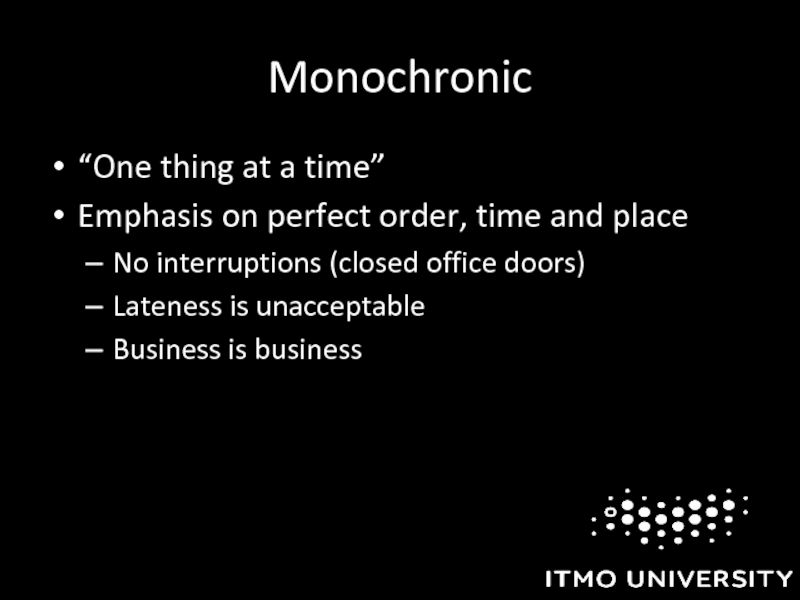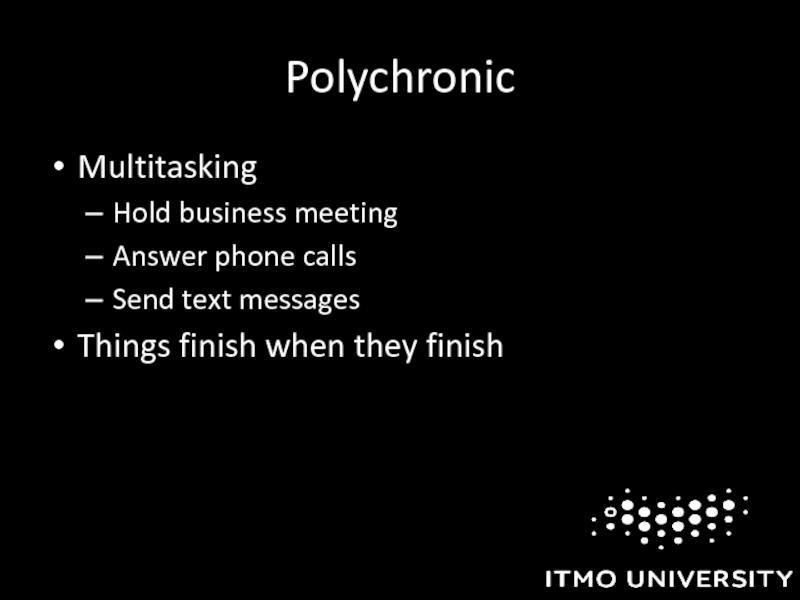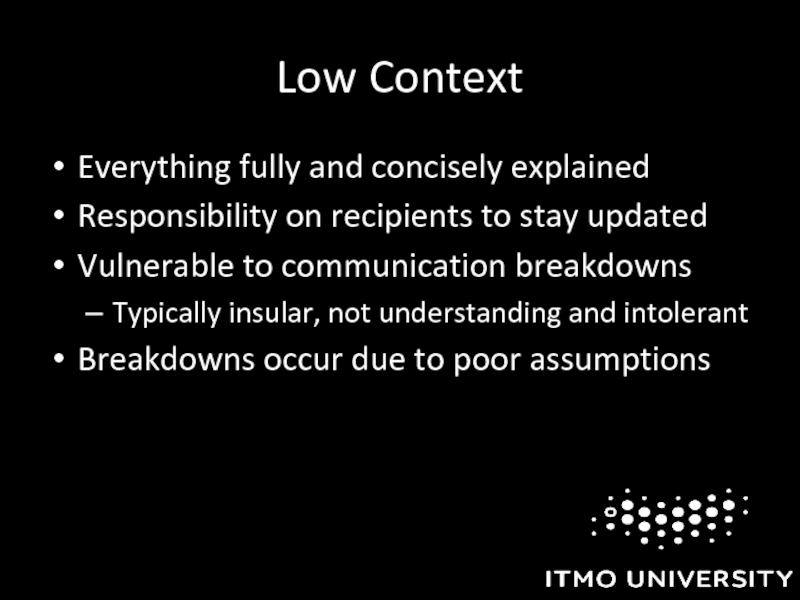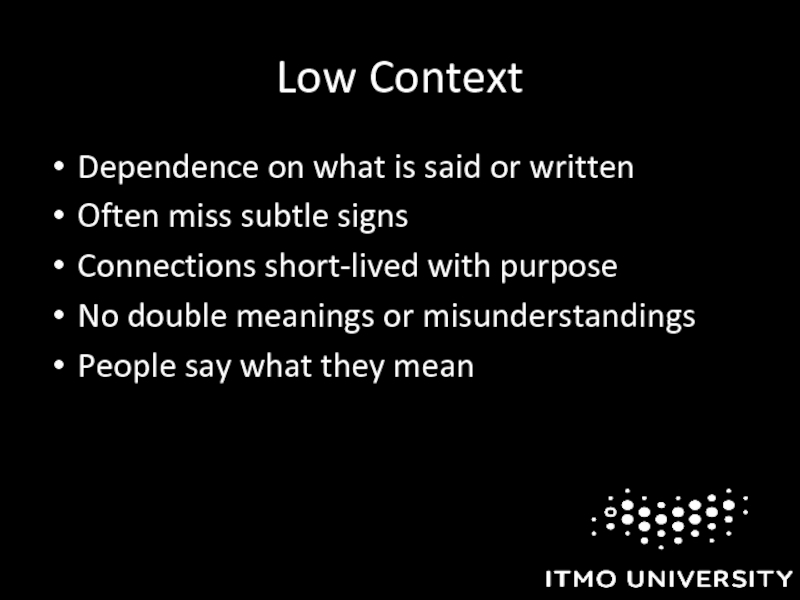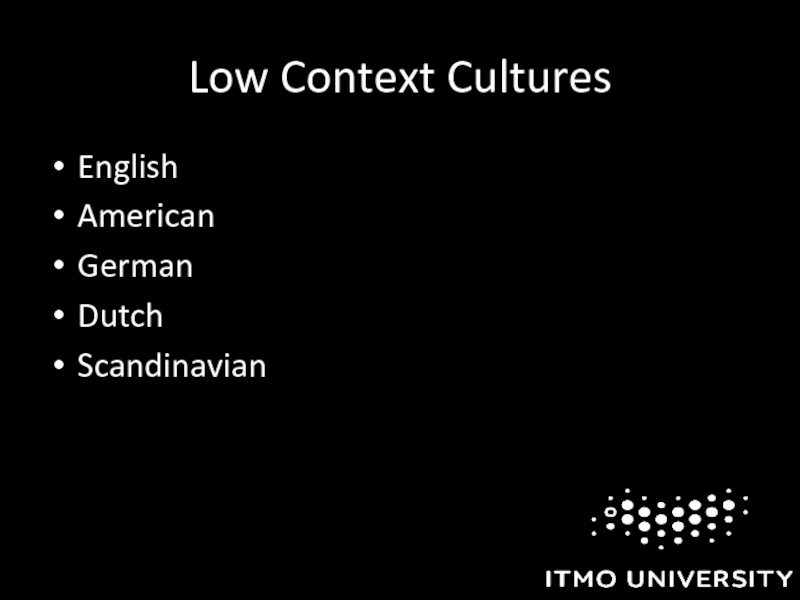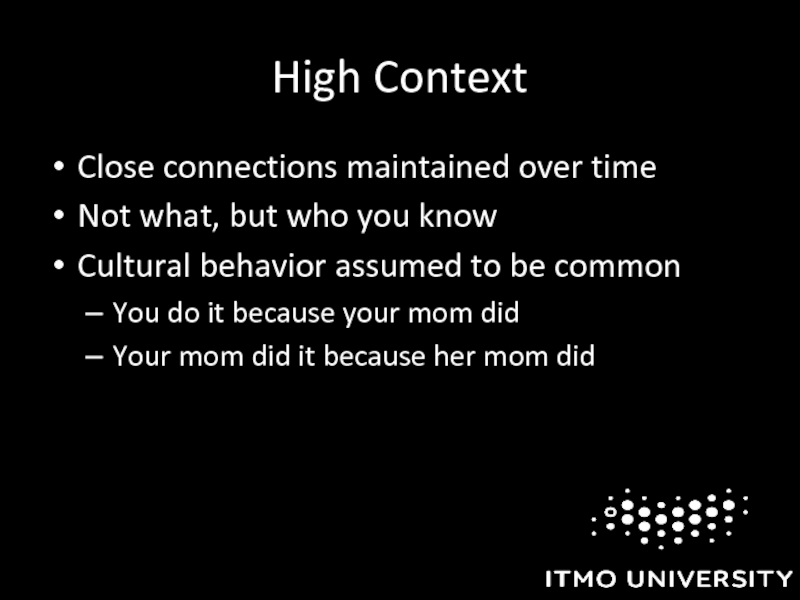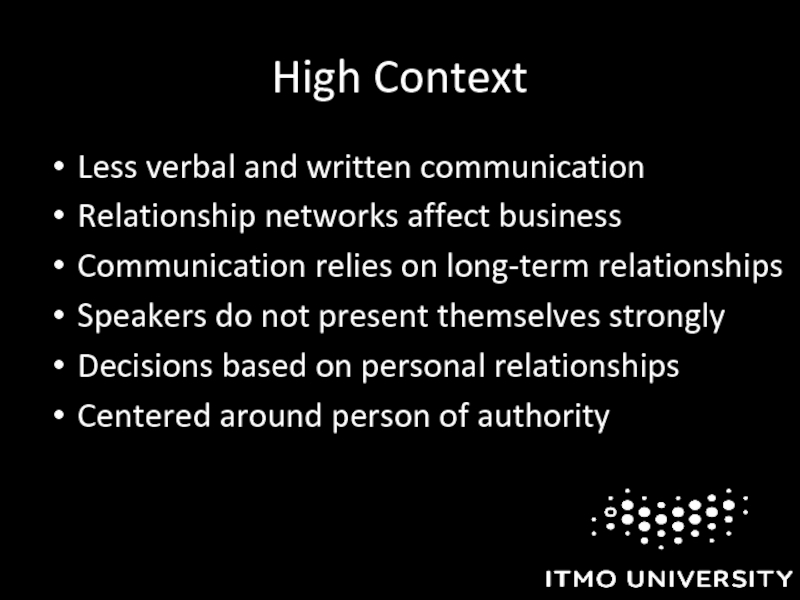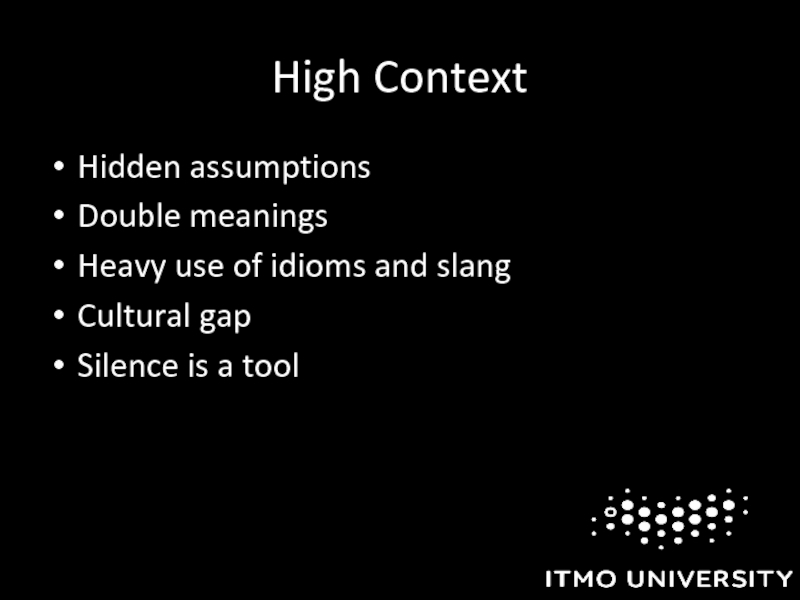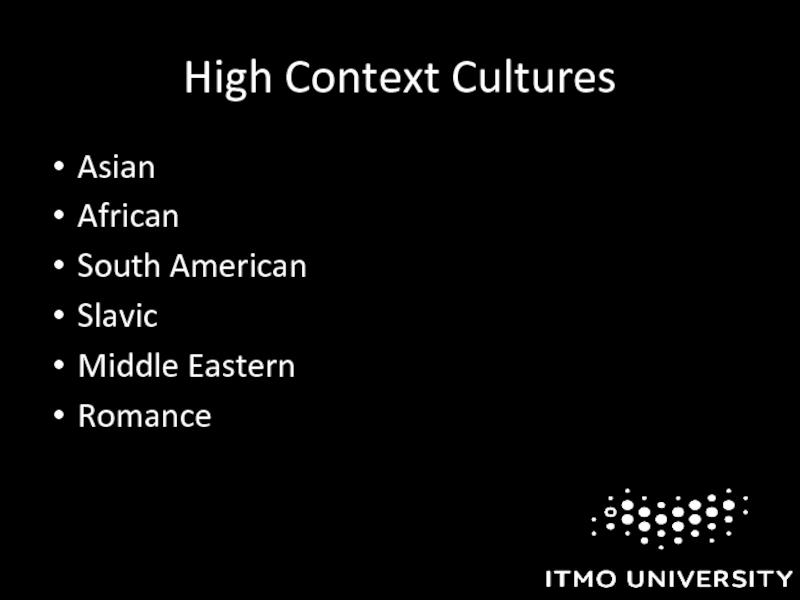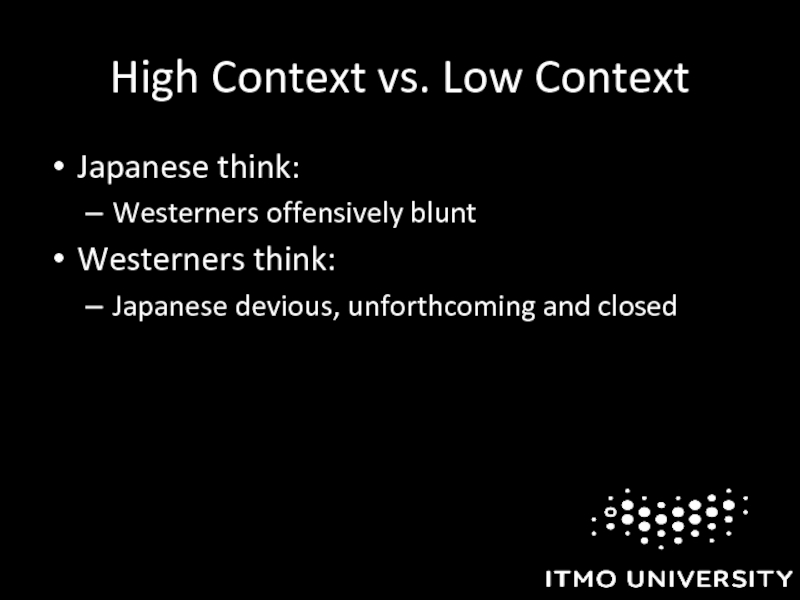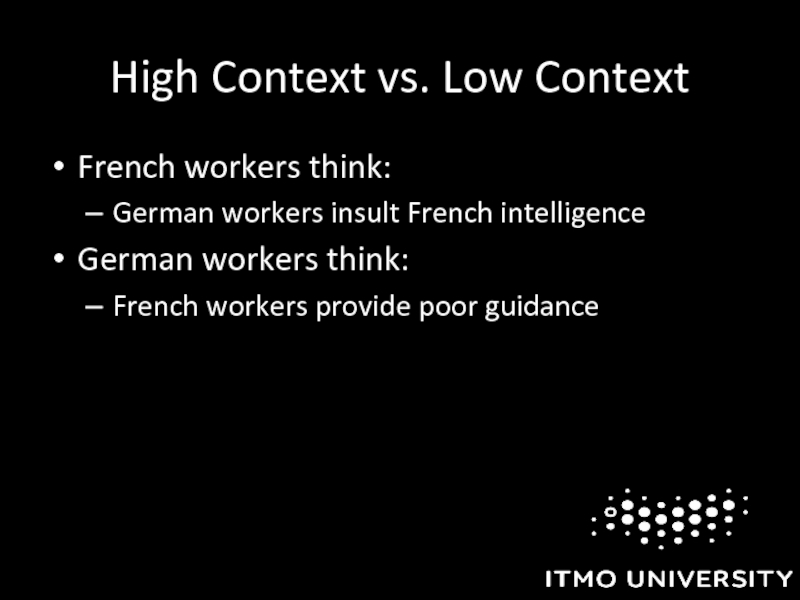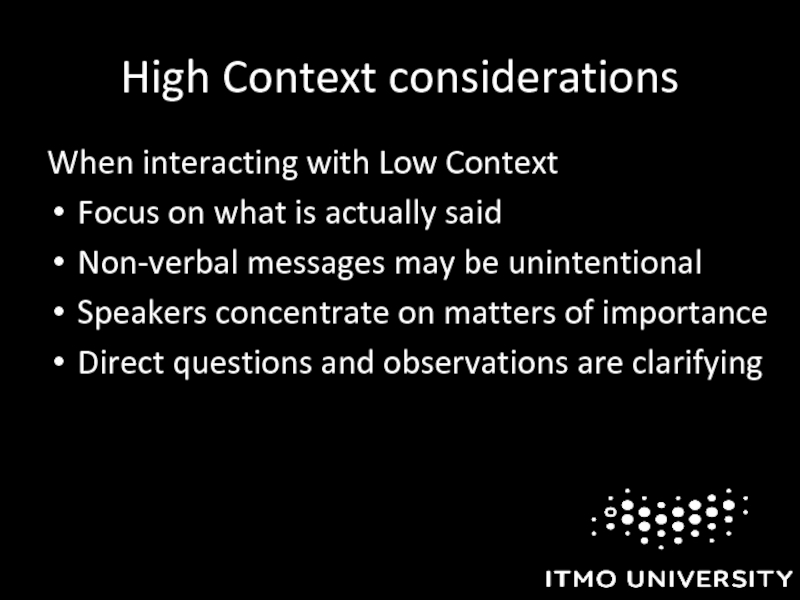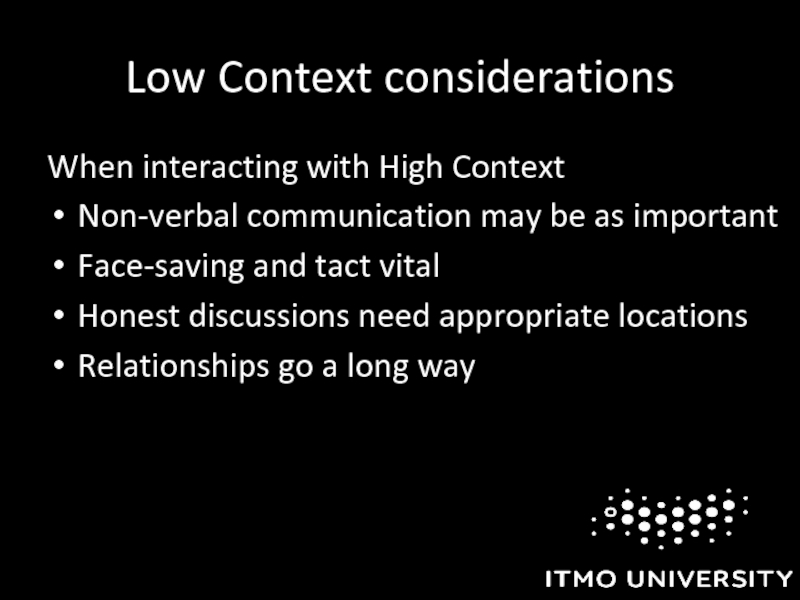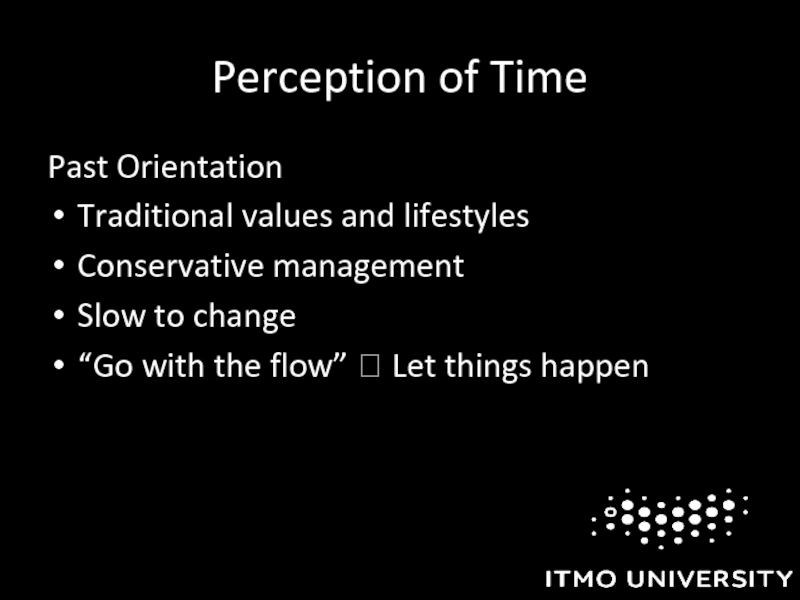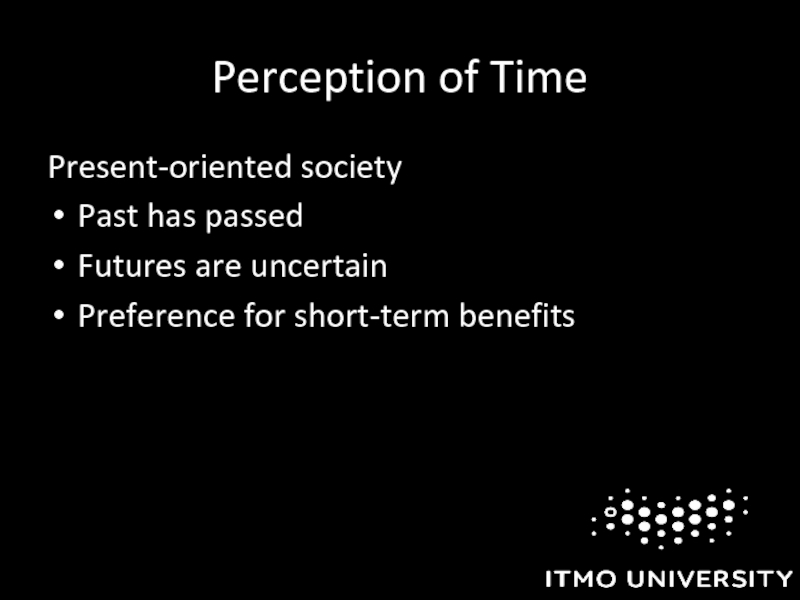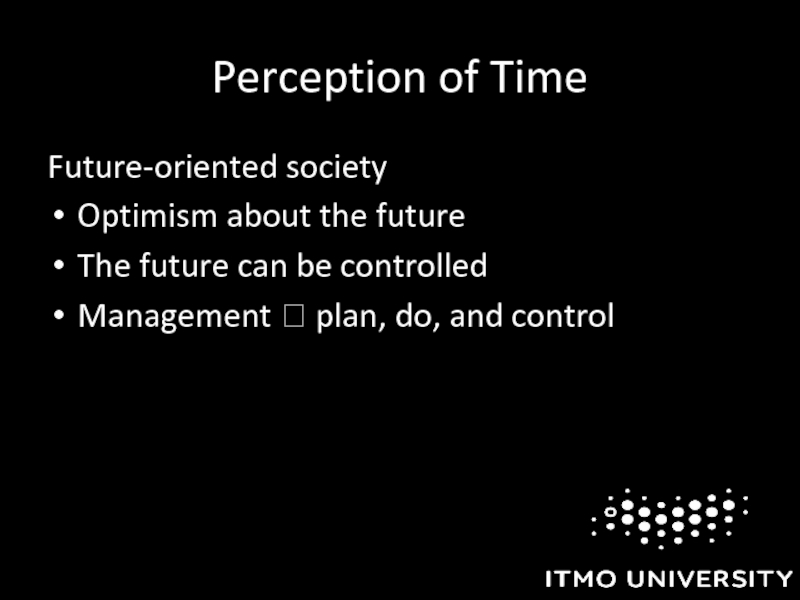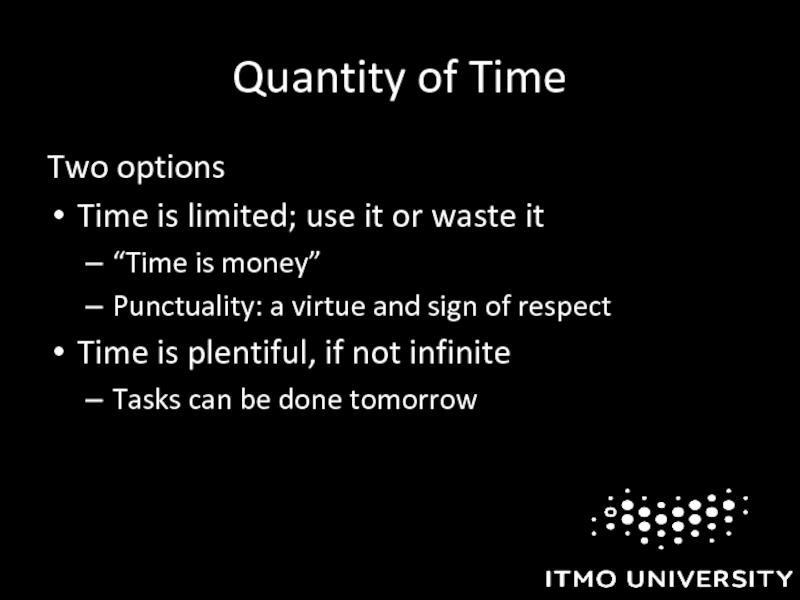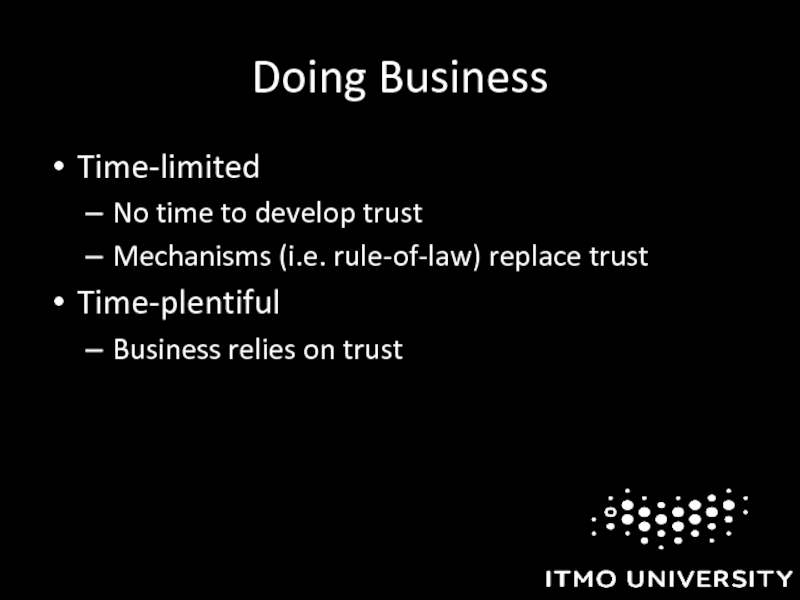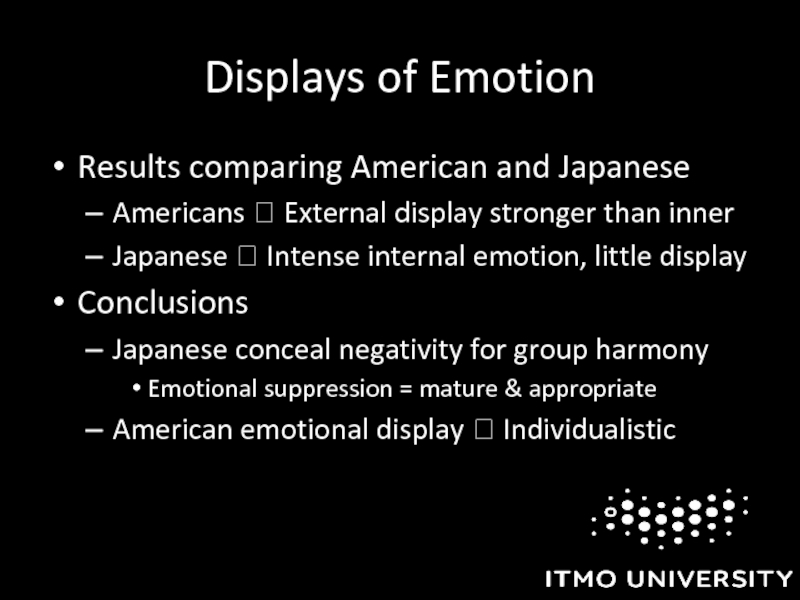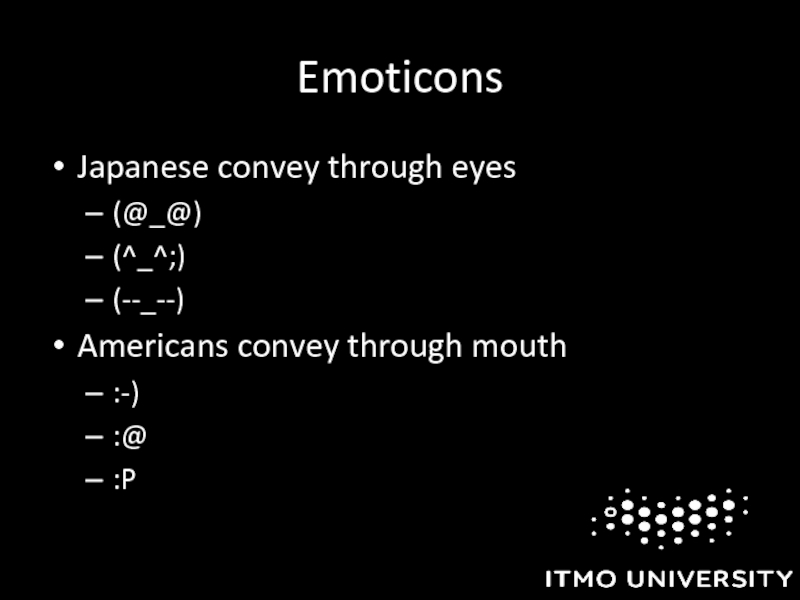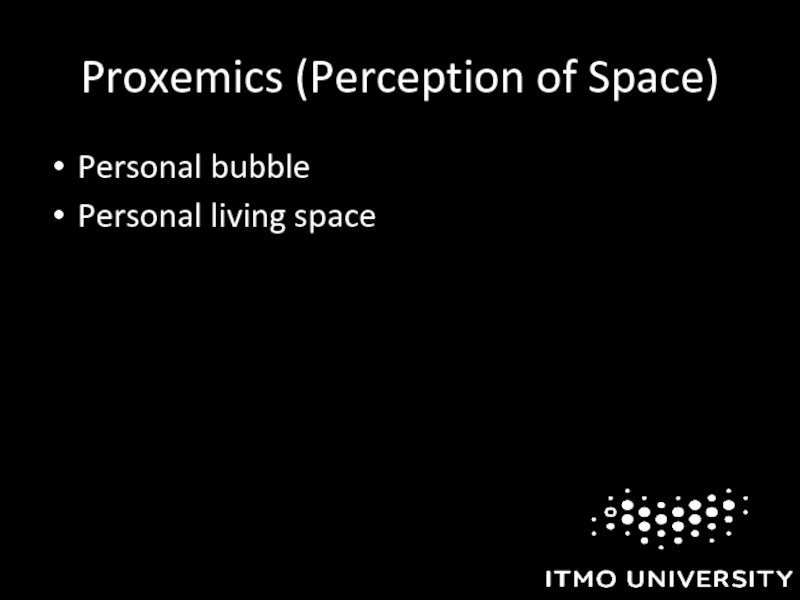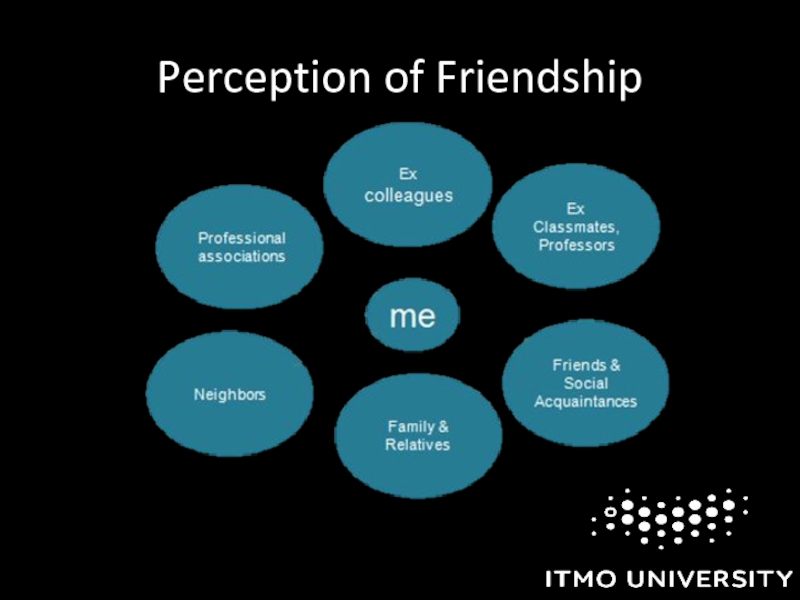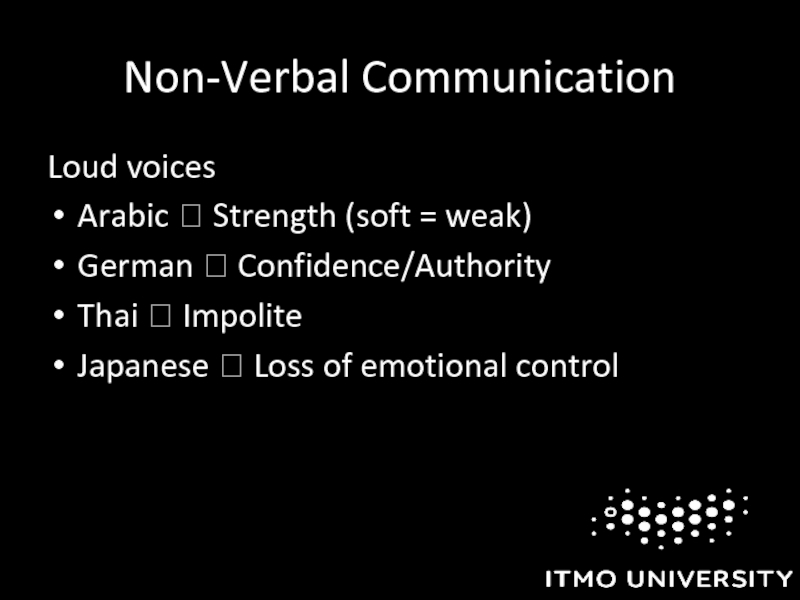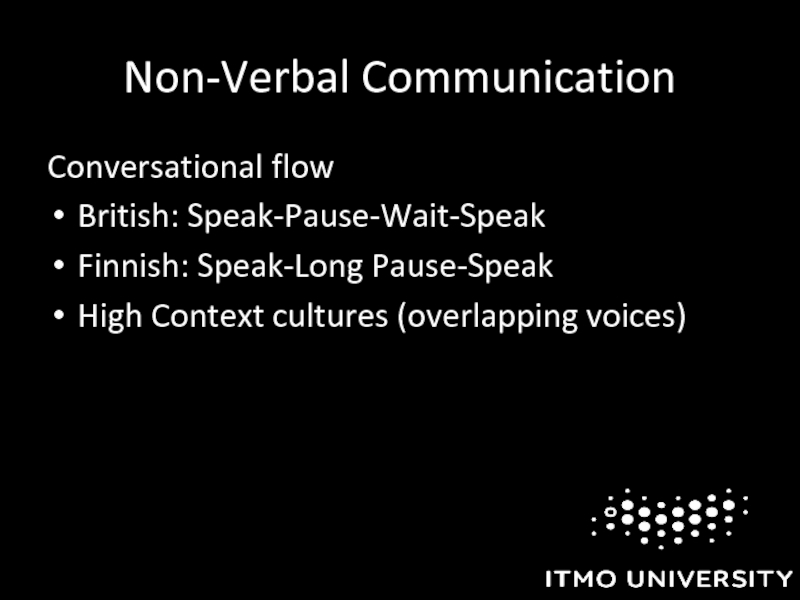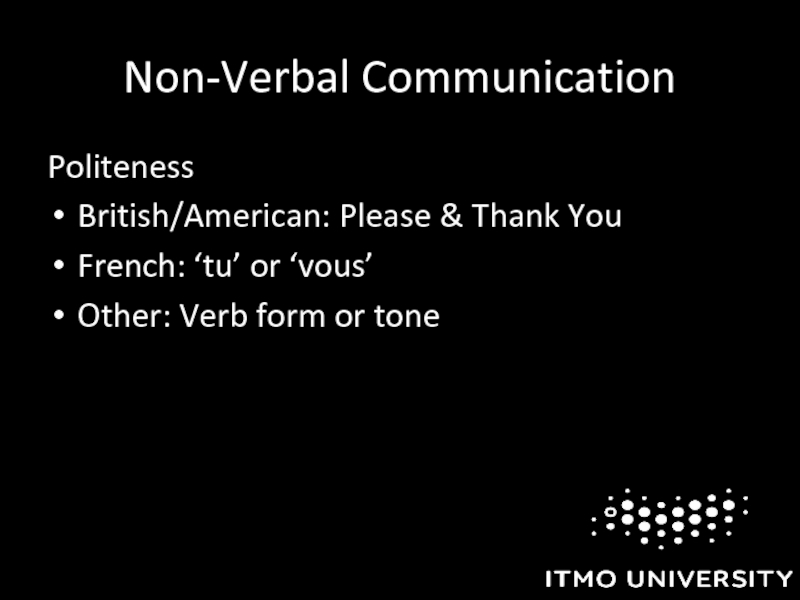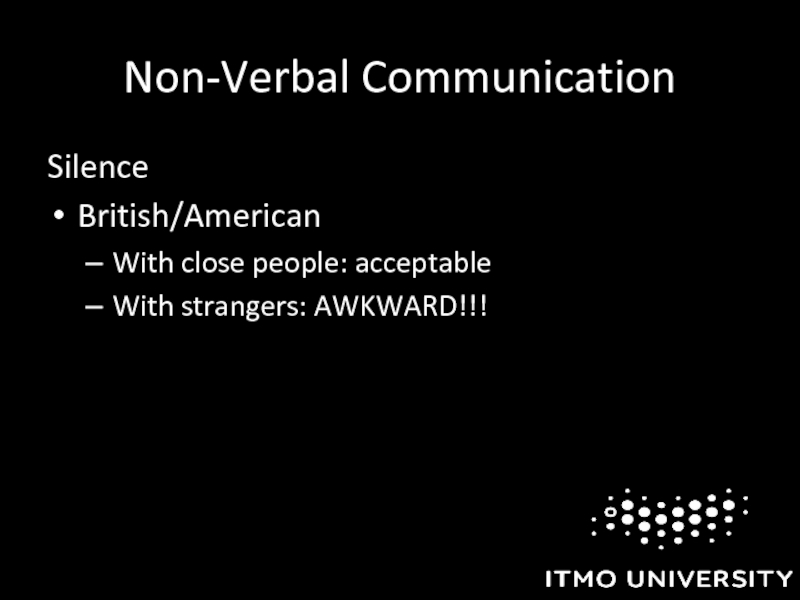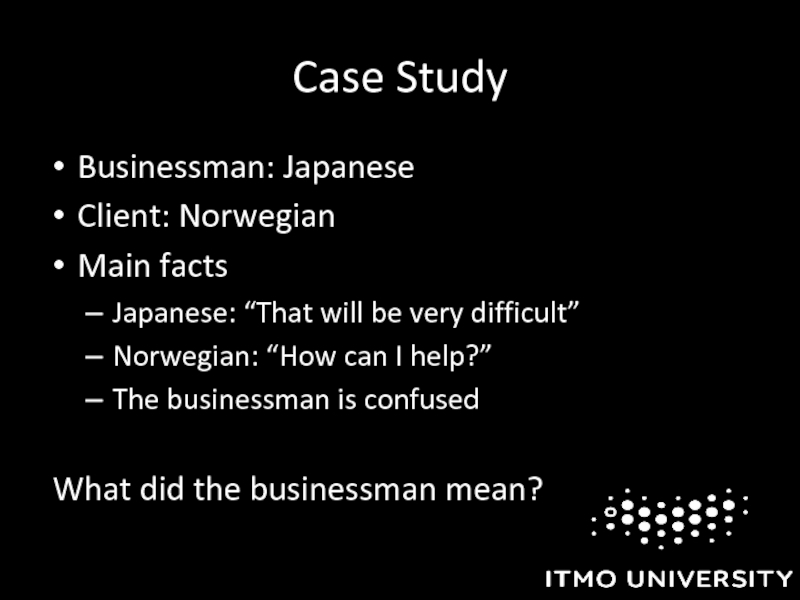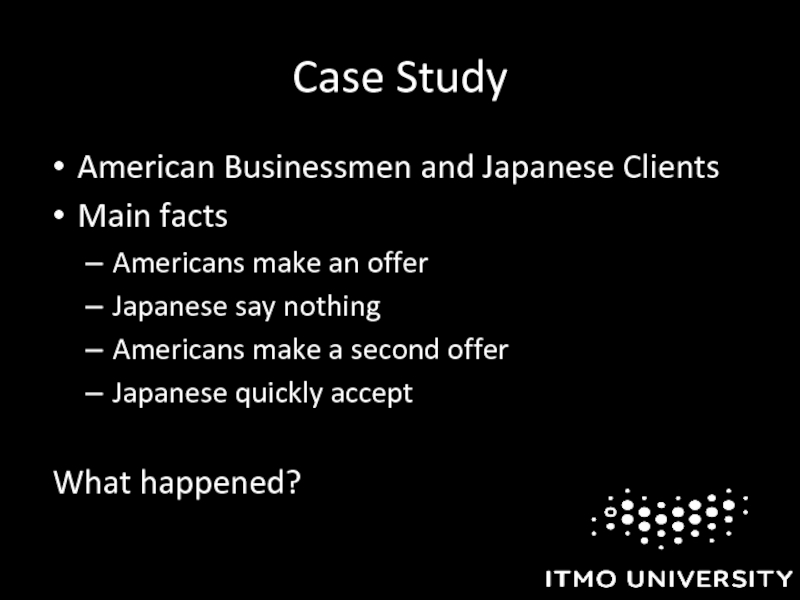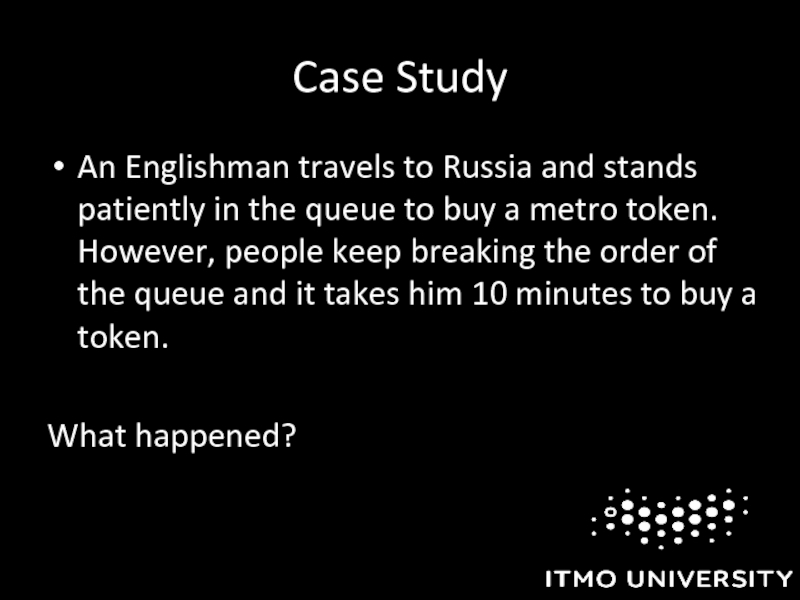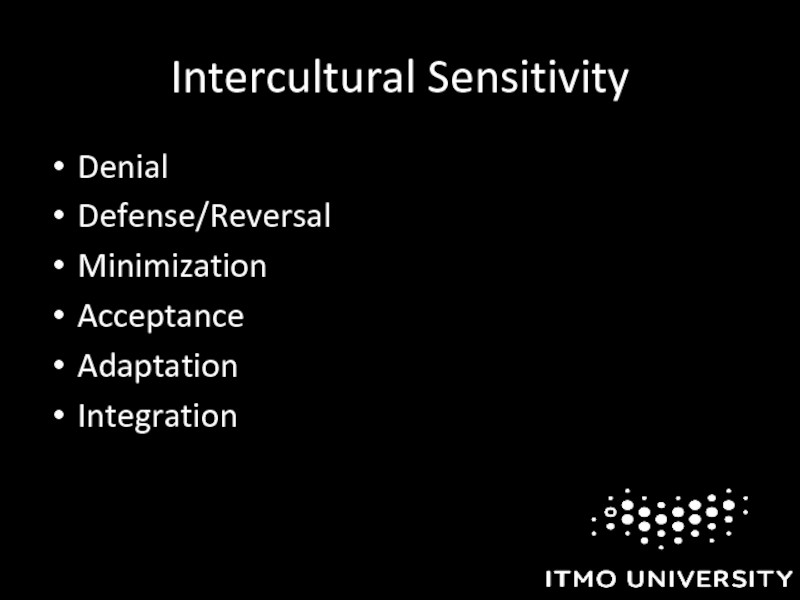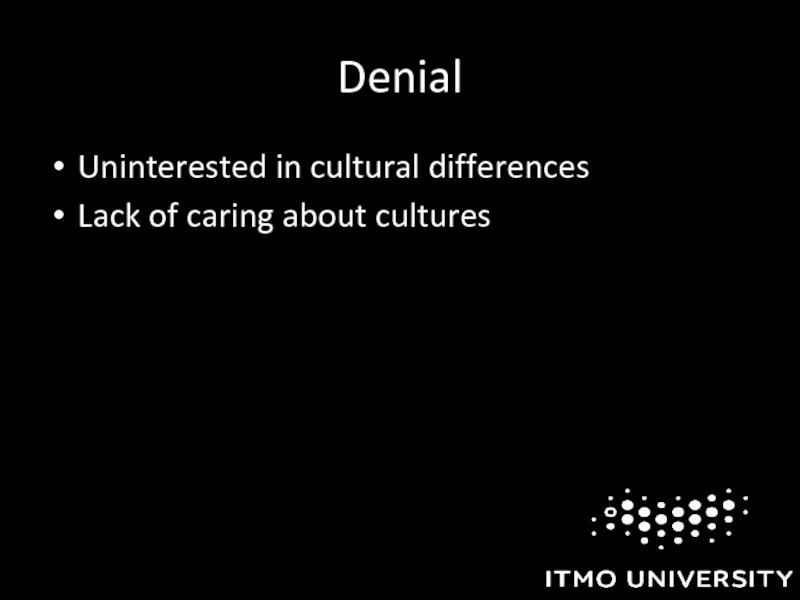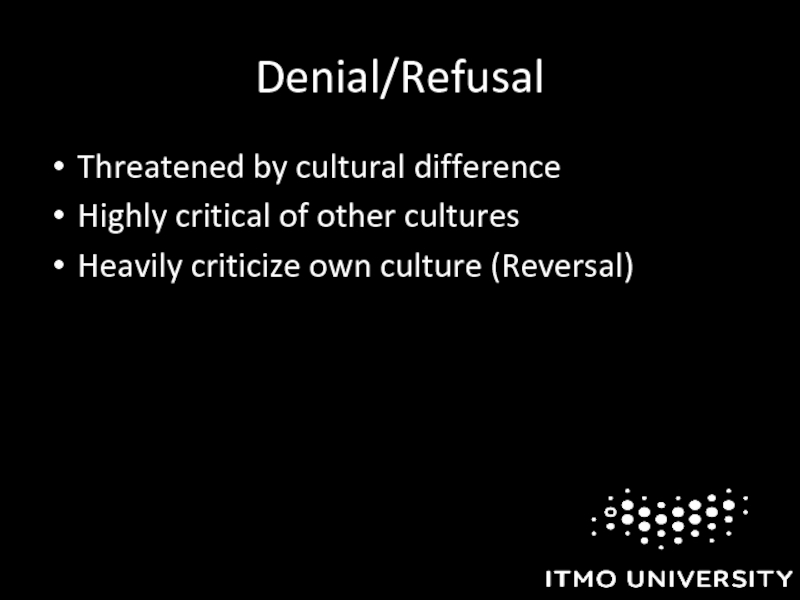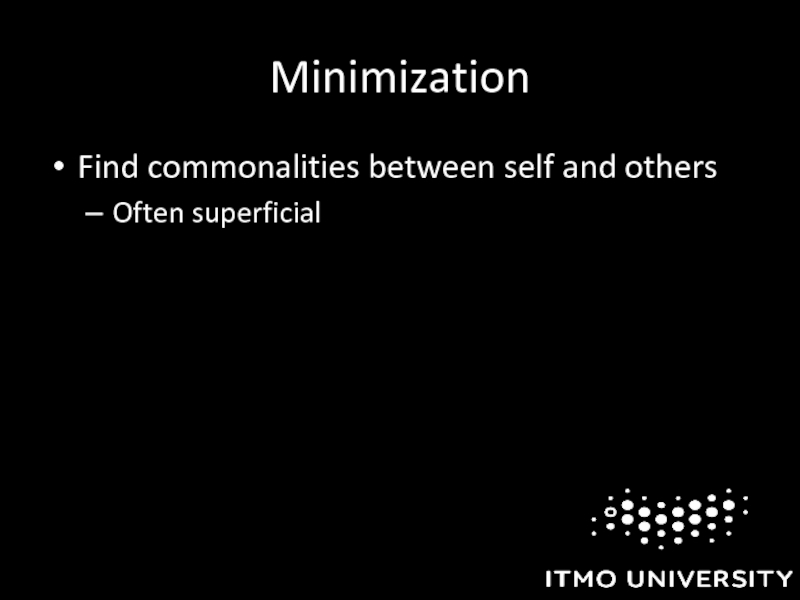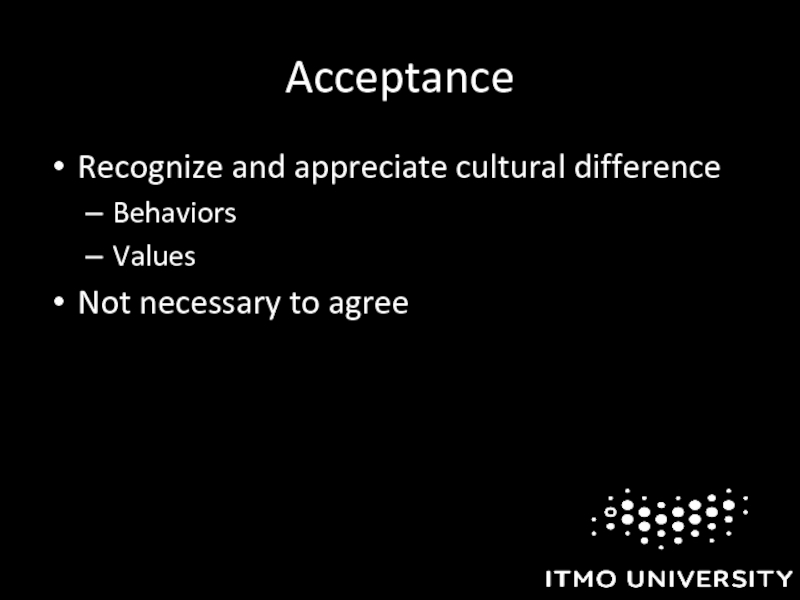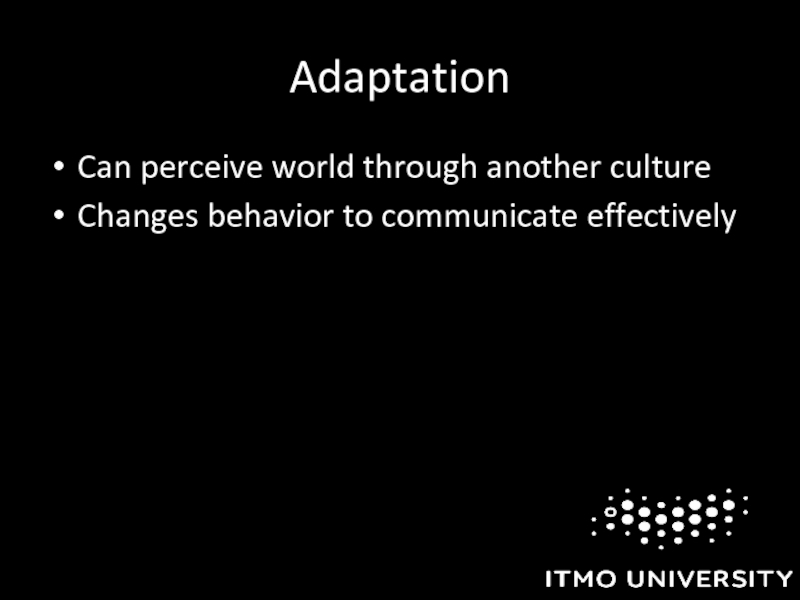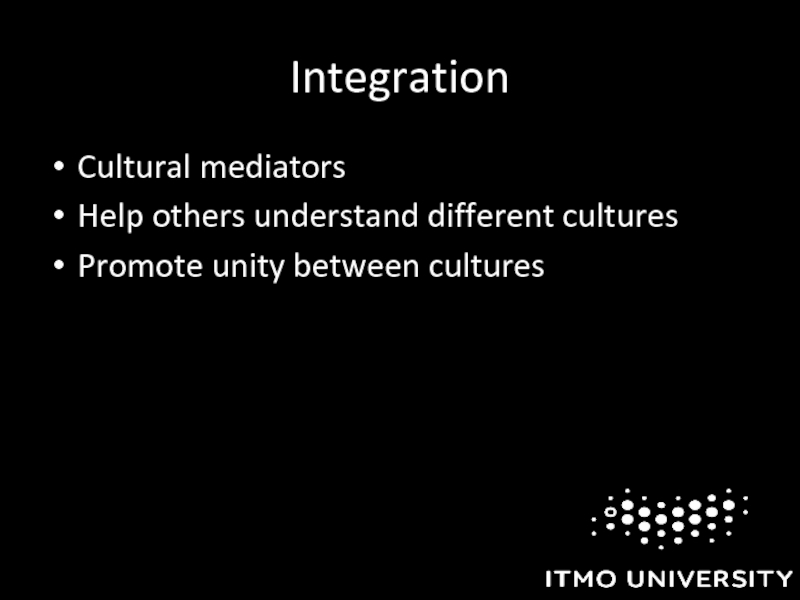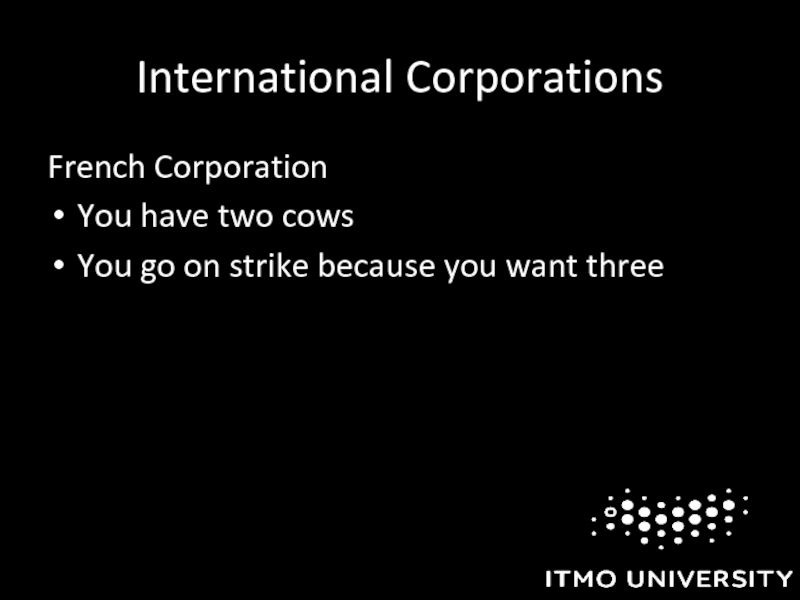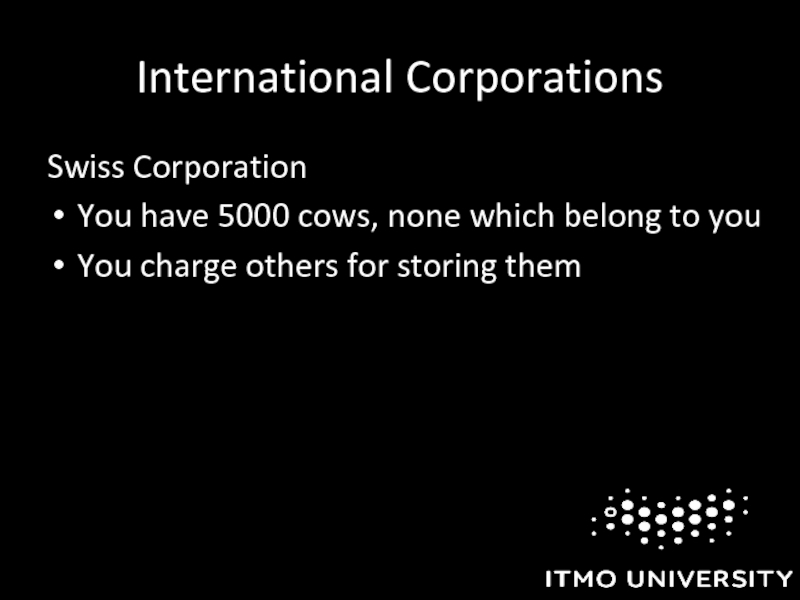- Главная
- Разное
- Дизайн
- Бизнес и предпринимательство
- Аналитика
- Образование
- Развлечения
- Красота и здоровье
- Финансы
- Государство
- Путешествия
- Спорт
- Недвижимость
- Армия
- Графика
- Культурология
- Еда и кулинария
- Лингвистика
- Английский язык
- Астрономия
- Алгебра
- Биология
- География
- Детские презентации
- Информатика
- История
- Литература
- Маркетинг
- Математика
- Медицина
- Менеджмент
- Музыка
- МХК
- Немецкий язык
- ОБЖ
- Обществознание
- Окружающий мир
- Педагогика
- Русский язык
- Технология
- Физика
- Философия
- Химия
- Шаблоны, картинки для презентаций
- Экология
- Экономика
- Юриспруденция
Cultural Measurements презентация
Содержание
- 1. Cultural Measurements
- 2. A wise man once said… In an
- 3. Cultural Characteristics Individualist vs Collectivist Monochronic vs
- 4. Common misconceptions Handshakes US firm, confident, 2-3
- 5. Perceptions of Americans “Americans are stupid and
- 6. Perceptions of Americans “In the US, life
- 7. Cultural Scales
- 8. Individualist Emphasis on the individual Self-determination (create
- 9. Collectivist People should identify with and join
- 10. Monochronic “One thing at a time” Emphasis
- 11. Polychronic Multitasking Hold business meeting Answer phone
- 12. Low Context Everything fully and concisely explained
- 13. Low Context Dependence on what is said
- 14. Low Context Topics are addressed directly and
- 15. Low Context Cultures English American German Dutch Scandinavian
- 16. High Context Close connections maintained over time
- 17. High Context Less verbal and written communication
- 18. High Context Hidden assumptions Double meanings Heavy
- 19. High Context Cultures Asian African South American Slavic Middle Eastern Romance
- 20. High Context vs. Low Context Japanese think:
- 21. High Context vs. Low Context French workers
- 22. High Context considerations When interacting with Low
- 23. Low Context considerations When interacting with High
- 24. Perception of Time Past Orientation Traditional values
- 25. Perception of Time Present-oriented society Past has passed Futures are uncertain Preference for short-term benefits
- 26. Perception of Time Future-oriented society Optimism about
- 27. Quantity of Time Two options Time is
- 28. Doing Business Time-limited No time to develop
- 29. Power Distance High power distance Bypassing structure
- 30. Displays of Emotion Results comparing American and
- 31. Emoticons Japanese convey through eyes (@_@) (^_^;) (--_--) Americans convey through mouth :-) :@ :P
- 32. Proxemics (Perception of Space) Personal bubble Personal living space
- 33. Perception of Friendship
- 34. Non-Verbal Communication Loud voices Arabic Strength
- 35. Non-Verbal Communication Conversational flow British: Speak-Pause-Wait-Speak Finnish: Speak-Long Pause-Speak High Context cultures (overlapping voices)
- 36. Non-Verbal Communication Politeness British/American: Please & Thank
- 37. Non-Verbal Communication Silence British/American With close people: acceptable With strangers: AWKWARD!!!
- 38. Non-Verbal Communication Smiling (American vs. Russian/Scandinavian) Gesturing
- 39. Case Study Client: French Company Options American
- 40. Case Study You American Client
- 41. Case Study Businessman: Japanese Client: Norwegian Main
- 42. Case Study American Businessmen and Japanese Clients
- 43. Case Study Rebecca works for a Chicago-based
- 44. Two Weeks Later… Abhinav: We’ve pulled all
- 45. Case Study An American executive in London
- 46. Case Study An Englishman travels to Russia
- 47. Case Study A high-ranking US government official
- 48. Case Study American: We want to take
- 49. Intercultural Sensitivity Denial Defense/Reversal Minimization Acceptance Adaptation Integration
- 50. Denial Uninterested in cultural differences Lack of caring about cultures
- 51. Denial/Refusal Threatened by cultural difference Highly critical of other cultures Heavily criticize own culture (Reversal)
- 52. Minimization Find commonalities between self and others Often superficial
- 53. Acceptance Recognize and appreciate cultural difference Behaviors Values Not necessary to agree
- 54. Adaptation Can perceive world through another culture Changes behavior to communicate effectively
- 55. Integration Cultural mediators Help others understand different cultures Promote unity between cultures
- 56. Stupid Cultural Jokes
- 57. International Corporations Traditional Capitalism You have two
- 58. International Corporations American Corporation You have 2
- 59. International Corporations French Corporation You have two
- 60. International Corporations Japanese Corporation You have two
- 61. International Corporations German Corporation You have two
- 62. International Corporations Italian corporation You have two
- 63. International Corporations Swiss Corporation You have 5000
- 64. International Corporations Indian Corporation You have two cows You worship them
- 65. v The European Commission just announced that
- 66. Ze Langadzh of ze Urop In the
- 67. Ze Langadzh of ze Urop There will
- 68. Ze Langadzh of ze Urop In the
- 69. Ze Langadzh of ze Urop In the
- 70. Ze Langadzh of ze Urop After zis
Слайд 2A wise man once said…
In an ideal world:
-The police are English
-The
mechanics are German
-The cooks are French
-The innkeepers are Swiss
-The lovers are Italian
-The cooks are French
-The innkeepers are Swiss
-The lovers are Italian
In a living hell:
-The police are German
-The mechanics are French
-The cooks are English
-The innkeepers are Italian
-The lovers are Swiss
Слайд 3Cultural Characteristics
Individualist vs Collectivist
Monochronic vs Polychronic
High context vs. Low context
Perception and
value of time
Power Distance
Perception of space
Power Distance
Perception of space
Слайд 4Common misconceptions
Handshakes
US
firm, confident, 2-3 seconds
Africa
limp, several minutes
Display of attraction
Britain: Men ought
not look
France: Men ought to look
French think Brits are gay
France: Men ought to look
French think Brits are gay
Слайд 5Perceptions of Americans
“Americans are stupid and unsubtle. They’re fat and bad
dressers.”
“Americans always want to say your name.”
“Americans are always in a hurry.”
“Americans are distant. They’re not close to anyone, even other Americans.”
“In the middle of nowhere, with no oncoming traffic, an American still stopped.”
“Americans always want to say your name.”
“Americans are always in a hurry.”
“Americans are distant. They’re not close to anyone, even other Americans.”
“In the middle of nowhere, with no oncoming traffic, an American still stopped.”
Слайд 6Perceptions of Americans
“In the US, life is only work.”
“In the US,
everything has to be discussed and analyzed. Why? Why? Why?”
“Americans are explicit. They want yes or no. Figurative speech confuses them.”
“An American professor said, ‘I don’t know, I need to look it up.’ Why is he teaching?”
“Americans are explicit. They want yes or no. Figurative speech confuses them.”
“An American professor said, ‘I don’t know, I need to look it up.’ Why is he teaching?”
Слайд 8Individualist
Emphasis on the individual
Self-determination (create own success)
Decisive, independent and shows initiative
Everyone
should abide by universal values
Personal success encouraged
Personal success encouraged
Слайд 9Collectivist
People should identify with and join groups
Groups protect their people
In return,
people give loyalty and compliance
Understanding that groups have differing values
Pursuit of group harmony and success
Understanding that groups have differing values
Pursuit of group harmony and success
Слайд 10Monochronic
“One thing at a time”
Emphasis on perfect order, time and place
No
interruptions (closed office doors)
Lateness is unacceptable
Business is business
Lateness is unacceptable
Business is business
Слайд 11Polychronic
Multitasking
Hold business meeting
Answer phone calls
Send text messages
Things finish when they finish
Слайд 12Low Context
Everything fully and concisely explained
Responsibility on recipients to stay updated
Vulnerable
to communication breakdowns
Typically insular, not understanding and intolerant
Breakdowns occur due to poor assumptions
Typically insular, not understanding and intolerant
Breakdowns occur due to poor assumptions
Слайд 13Low Context
Dependence on what is said or written
Often miss subtle signs
Connections
short-lived with purpose
No double meanings or misunderstandings
People say what they mean
No double meanings or misunderstandings
People say what they mean
Слайд 14Low Context
Topics are addressed directly and precisely
Verbal is primary
Non-verbal is background
Speakers
show no hesitation offering opinions
Interpersonal contact is superficial
Task-oriented
Interpersonal contact is superficial
Task-oriented
Слайд 16High Context
Close connections maintained over time
Not what, but who you know
Cultural
behavior assumed to be common
You do it because your mom did
Your mom did it because her mom did
You do it because your mom did
Your mom did it because her mom did
Слайд 17High Context
Less verbal and written communication
Relationship networks affect business
Communication relies on
long-term relationships
Speakers do not present themselves strongly
Decisions based on personal relationships
Centered around person of authority
Speakers do not present themselves strongly
Decisions based on personal relationships
Centered around person of authority
Слайд 18High Context
Hidden assumptions
Double meanings
Heavy use of idioms and slang
Cultural gap
Silence is
a tool
Слайд 20High Context vs. Low Context
Japanese think:
Westerners offensively blunt
Westerners think:
Japanese devious, unforthcoming
and closed
Слайд 21High Context vs. Low Context
French workers think:
German workers insult French intelligence
German
workers think:
French workers provide poor guidance
French workers provide poor guidance
Слайд 22High Context considerations
When interacting with Low Context
Focus on what is actually
said
Non-verbal messages may be unintentional
Speakers concentrate on matters of importance
Direct questions and observations are clarifying
Non-verbal messages may be unintentional
Speakers concentrate on matters of importance
Direct questions and observations are clarifying
Слайд 23Low Context considerations
When interacting with High Context
Non-verbal communication may be as
important
Face-saving and tact vital
Honest discussions need appropriate locations
Relationships go a long way
Face-saving and tact vital
Honest discussions need appropriate locations
Relationships go a long way
Слайд 24Perception of Time
Past Orientation
Traditional values and lifestyles
Conservative management
Slow to change
“Go with
the flow” Let things happen
Слайд 25Perception of Time
Present-oriented society
Past has passed
Futures are uncertain
Preference for short-term benefits
Слайд 26Perception of Time
Future-oriented society
Optimism about the future
The future can be controlled
Management
plan, do, and control
Слайд 27Quantity of Time
Two options
Time is limited; use it or waste it
“Time
is money”
Punctuality: a virtue and sign of respect
Time is plentiful, if not infinite
Tasks can be done tomorrow
Punctuality: a virtue and sign of respect
Time is plentiful, if not infinite
Tasks can be done tomorrow
Слайд 28Doing Business
Time-limited
No time to develop trust
Mechanisms (i.e. rule-of-law) replace trust
Time-plentiful
Business relies
on trust
Слайд 29Power Distance
High power distance
Bypassing structure is unacceptable
Low power distance
Chain of command
may be bypassed
Superiors and subordinates interact as equals
Professors and graduate students indistinguishable
Superiors and subordinates interact as equals
Professors and graduate students indistinguishable
Слайд 30Displays of Emotion
Results comparing American and Japanese
Americans External display stronger
than inner
Japanese Intense internal emotion, little display
Conclusions
Japanese conceal negativity for group harmony
Emotional suppression = mature & appropriate
American emotional display Individualistic
Japanese Intense internal emotion, little display
Conclusions
Japanese conceal negativity for group harmony
Emotional suppression = mature & appropriate
American emotional display Individualistic
Слайд 31Emoticons
Japanese convey through eyes
(@_@)
(^_^;)
(--_--)
Americans convey through mouth
:-)
:@
:P
Слайд 34Non-Verbal Communication
Loud voices
Arabic Strength (soft = weak)
German Confidence/Authority
Thai
Impolite
Japanese Loss of emotional control
Japanese Loss of emotional control
Слайд 35Non-Verbal Communication
Conversational flow
British: Speak-Pause-Wait-Speak
Finnish: Speak-Long Pause-Speak
High Context cultures (overlapping voices)
Слайд 36Non-Verbal Communication
Politeness
British/American: Please & Thank You
French: ‘tu’ or ‘vous’
Other: Verb form
or tone
Слайд 37Non-Verbal Communication
Silence
British/American
With close people: acceptable
With strangers: AWKWARD!!!
Слайд 38Non-Verbal Communication
Smiling (American vs. Russian/Scandinavian)
Gesturing (Latino vs. Japanese)
Head movements reverse (American
vs. Indian)
Crossing legs (Western Europe vs. Arab)
Crossing legs (Western Europe vs. Arab)
Слайд 39Case Study
Client: French Company
Options
American Company
Mexican Company
Who did the French choose? Why?
Слайд 40Case Study
You American
Client Austrian
Main facts
6 business meetings in 4
months
The client calls you “Herr Smith”
As an American, what is your reaction?
The client calls you “Herr Smith”
As an American, what is your reaction?
Слайд 41Case Study
Businessman: Japanese
Client: Norwegian
Main facts
Japanese: “That will be very difficult”
Norwegian: “How
can I help?”
The businessman is confused
What did the businessman mean?
The businessman is confused
What did the businessman mean?
Слайд 42Case Study
American Businessmen and Japanese Clients
Main facts
Americans make an offer
Japanese say
nothing
Americans make a second offer
Japanese quickly accept
What happened?
Americans make a second offer
Japanese quickly accept
What happened?
Слайд 43Case Study
Rebecca works for a Chicago-based company. Abhinav works for an
India-based company.
Rebecca: We need to get all our customer service employers trained in the next 2 weeks. Can you do it?
Abhinav: That timeline is aggressive. Do you think it’s possible?
Rebecca: It will require creativity and hard work but I think so.
Abhinav: Ok.
Rebecca: Now that business is finished, how is everything else?
Abhinav: All’s well, although the heavy monsoons are causing delays getting around the city.
Rebecca: We need to get all our customer service employers trained in the next 2 weeks. Can you do it?
Abhinav: That timeline is aggressive. Do you think it’s possible?
Rebecca: It will require creativity and hard work but I think so.
Abhinav: Ok.
Rebecca: Now that business is finished, how is everything else?
Abhinav: All’s well, although the heavy monsoons are causing delays getting around the city.
Слайд 44Two Weeks Later…
Abhinav: We’ve pulled all our resources together and I’m
happy to say that 60% of customer service reps are trained. The remaining 40% will be done in 2 weeks.
Rebecca: Only 60%? We agreed they all would be trained by now!
Abhinav: Yes. The monsoon is over now so the rest of training should be fast.
Rebecca: The training is critical. Please get it done as soon as possible.
Abhinav: I am certain it will be done.
Rebecca: Only 60%? We agreed they all would be trained by now!
Abhinav: Yes. The monsoon is over now so the rest of training should be fast.
Rebecca: The training is critical. Please get it done as soon as possible.
Abhinav: I am certain it will be done.
Слайд 45Case Study
An American executive in London complained that he had taken
his wife to a traditional English pub and an English couple decided to sit at their table. “First, they sat without asking, then they ignored us,” he complained.
What happened?
What happened?
Слайд 46Case Study
An Englishman travels to Russia and stands patiently in the
queue to buy a metro token. However, people keep breaking the order of the queue and it takes him 10 minutes to buy a token.
What happened?
What happened?
Слайд 47Case Study
A high-ranking US government official accidentally delayed negotiations with the
Soviets on nuclear weapons. In response to a “No” from the Soviets regarding a proposal, the official stopped talking about it. Several months later, the Russians told a visiting American they had been surprised.
What happened?
What happened?
Слайд 48Case Study
American: We want to take a plane from A to
B.
Japanese: Are you sure?
American: Yes.
Japanese: Maybe you would prefer a train?
American: No, a plane.
Japanese: How about a bus? American: No, a plane. Don’t you understand?
What happened?
Japanese: How about a bus? American: No, a plane. Don’t you understand?
What happened?
Слайд 51Denial/Refusal
Threatened by cultural difference
Highly critical of other cultures
Heavily criticize own culture
(Reversal)
Слайд 54Adaptation
Can perceive world through another culture
Changes behavior to communicate effectively
Слайд 55Integration
Cultural mediators
Help others understand different cultures
Promote unity between cultures
Слайд 57International Corporations
Traditional Capitalism
You have two cows
You sell one and buy a
bull
Your herd multiplies & the economy grows
You sell them & retire
Your herd multiplies & the economy grows
You sell them & retire
Слайд 58International Corporations
American Corporation
You have 2 cows; sell 3 to your company
using your brother’s credit; do a credit default swap to get 4 cows with a tax exemption for 5 cows; transfer the rights to 6 cows through a shadow company who sells the rights to 7 cows back to your company; the annual report says the company owns 8 cows with an option for 1 more.
The public buys your bull.
The public buys your bull.
Слайд 59International Corporations
French Corporation
You have two cows
You go on strike because you
want three
Слайд 60International Corporations
Japanese Corporation
You have two cows
Redesign them so they are 1/10th
the size & produce 20 times more milk
Create “cowkimon”
Create “cowkimon”
Слайд 61International Corporations
German Corporation
You have two cows
You reengineer tem so they live
for 100 years, eat once a month and milk themselves
Слайд 62International Corporations
Italian corporation
You have two cows
You don’t know where they are
You
break for lunch
Слайд 63International Corporations
Swiss Corporation
You have 5000 cows, none which belong to you
You
charge others for storing them
Слайд 65v
The European Commission just announced that English will replace German as
the EU official language.
Her Majesty’s Government acknowledged that a five-year phase-in plan will take place known as “Euro-English.”
Her Majesty’s Government acknowledged that a five-year phase-in plan will take place known as “Euro-English.”
Слайд 66Ze Langadzh of ze Urop
In the first year, “s” will replace
the soft “c”. Sertainly, this will make sivil servant happy.
The hard “c” will be dropped for “k”. This should klear up konfusion and keyboards kan have 1 less letter.
The hard “c” will be dropped for “k”. This should klear up konfusion and keyboards kan have 1 less letter.
Слайд 67Ze Langadzh of ze Urop
There will be publik enthusiasm in the
sekond year, when “ph” will be “f”. Words like “fotograf” are 20% shorter.
Слайд 68Ze Langadzh of ze Urop
In the third year, publik akseptanse of
the new spelling kan be ekspekted to reach the stage where more komplikated changes are possible. Governments will enkorage the removal of double letters, which have always ben a deterent to akurate speling. Also, al wil agre that the horible mes of the silent “e”s wil go away.
Слайд 69Ze Langadzh of ze Urop
In the fourth year, peopl wil be
reseptiv to replasing “th” with “z” and “w” with “v”. During ze fifz year, ze unesesary “o” kan be dropd from vords kontaining “ou” and similar changes vud of kors be aplid to ozer kombinations of leters.
Слайд 70Ze Langadzh of ze Urop
After zis fifz year, ve vil hav
a reli sensibl riten styl. Zer vil be no more trubl or difikultis and evrivun vil find it ezi to undertstand ech ozer. Ze drem vil finali kum tru!


